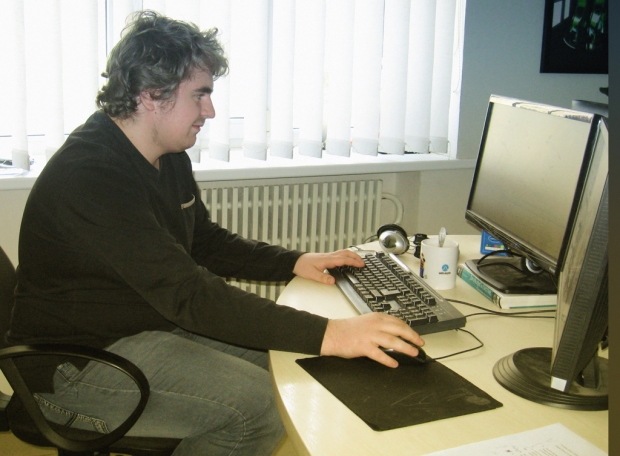12 questions for a programmer

On the eve of the birthday of our beloved programmer Sergey, we decided to interview him and find out some professional secrets.
Professional programmers are unique people. Their level of intelligence is high, their thinking is flexible and prone to analysis, they understand the intricacies and complexities of artificial intelligence, and not everyone can do this. Programmers live more virtual lives than real ones, they have a special attitude to some things, they know their own language, which is incomprehensible to outsiders, and can often be owners of extravagant appearance. Perhaps this is due to the fact that the passion for programming has a big impact on their lifestyle. But the less good programmers are worth their weight in gold, as they are a key link in IT.
So do we. The key figure of our team is the programmer Sergey:
Education: System Analyst Engineer
Specialty: Computer systems and networks
Profession: Leading PHP developer
Likes: Technology, gadgets, chess, poker
Dislikes: Human stupidity
Dream: Pass the Zend PHP 5 Certification exam
Sergey, like many programmers, jokingly calls himself a bydlokoder, but this does not underestimate his merits. This suggests that there is no limit to perfection. After all, no matter how well the code is written, you can find a better, more optimal way to implement it.
1. As you know, the IT market is growing, the demand for qualified specialists is increasing. Computer professions are promising and highly paid, many people are attracted by this, and they want to join the world of information technology by becoming programmers. Do you think, guided by the desire to earn money, you can achieve success in programming?
- I think that programming should be fun first of all. It takes patience to learn the basics. I do a little tutoring and I was faced with the fact that people come with a request to teach how to “make websites, cut orders and make money”. At the same time, they say that they do not want to learn the basics of programming, they need everything at once. Naturally, this is the wrong approach.
2. In your opinion, does the education he received in any educational institution affect the level of programmer's training?
– I think that the classical education itself does not have much influence. Of course, at a university or in courses they can teach you the basics of programming. But you can fully study all the nuances of this case only on your own experience, as they say, by trial and error. The main thing is self-education and a constant desire to improve their knowledge.
3. Why did you decide to become a programmer, and how long ago did this idea come to you?
- Good question. Why? Let's put it this way: the idea came up to create a website somewhere in 2007, when I didn't know PHP or other programming languages. I was a green noob, so I created a website using the Narod.ru constructor. Then I realized that I needed to move on, since there were a lot of ideas, but it was not possible to implement them on the constructor. Decided to learn a programming language for writing web pages. Got to PHP. I won't remember the first script... It was scary. It was a custom script (a little freelancing). He was terrible. But then I decided to thoroughly approach the study of the language, the technique of writing code improved. That's how I came to the web. Started to pedal the code. I wrote a small CMS, on which 3-4 sites worked for about half a year. Further practice and development of commercial projects.
4. Do you like your job?
- For now, yes.
5. What exactly do you like?
- The main plus is interesting projects that you can think about. At the same time, the technique is being improved, I learn a lot of new things, grow professionally. But there are also disadvantages. The main thing that I don’t like is when they force me to do something that is not part of my duties. For example, at my old place of work, I had a situation when they hung up on me the layout of the site from scratch, this is not just a blog layout, but a full-fledged layout.
6. Do you want to become a successful professional programmer?
- Where am I going. It seems to me that everyone wants it, but not everyone succeeds.
7. I think that not all programmers set such a goal for themselves. Many do not seek to improve their skills.
- If a person wants to connect his activity with programming and improve his financial condition, then he must strive for development, otherwise nothing sensible will come of it.
8. How do you improve your professional skills?
– I write the code (laughs). I gain practical experience, backing it up with theoretical knowledge.
9. What is the future of programming?
– I believe that web programming is a promising area that will develop rapidly, so we have chosen the right industry.
10. How do you relax from hard working days. Does it happen that after a day of programming at work, you come home and continue to write code?
- Yes, sometimes. At home, I continue to write code for work projects, sometimes I program something of my own. I play computer games to distract myself. And sometimes I just take a break from everything.
11. Do you have a hobby?
- Yes! Programming. Actually, I like chess, poker.
12. What advice would you give to beginners, novice programmers?
- Don't start! But if there is a great desire, then RTFM - "Read The Fucking Manual" Study, study and study again.
Here he is our Seryozha! Humble and skilled programmer. Happy birthday! More strength and energy. We wish you to reach incredible heights in your favorite business.

According to the programmers themselves, this is not a profession, but a vocation. It is known that a favorite job is a highly paid hobby. Therefore, if you feel strong in yourself, have a great desire to learn and you are passionate about programming, develop, do not stand still and you will succeed.
